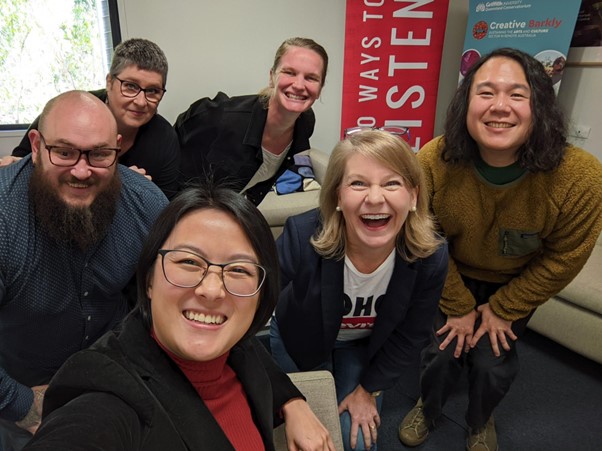By Emma Heard and Brydie-Leigh Bartleet
How can community-centred music making contribute to creating places where all people are able to live the lives they want to live and are accepted? Can music contribute to the structural changes needed to address inequity – that is, unjust differences in life outcomes that groups of people within our society experience? These are some of the challenging and exciting questions being asked by the Creative Change Project. Led by Professor Brydie-Leigh Bartleet, the Creative Change Project, is a national research project funded by the Australian Research Council and housed at the Creative Arts Research Institute, Queensland Conservatorium Griffith University.

We know that participating in music can have social, cultural, physiological, and economic benefits. Evidence suggests community-centred music making can support individual people with wellbeing and social connection, identity formation and affirmation, and developing confidence and empowerment.
Participating in music can also work to bring diverse groups of people together and supports people in developing empathy and tolerance for people different from themselves. Some research also suggests that community-centred music making may create positive social change at the societal level through challenging harmful norms and stereotypes, being a tool for advocacy and awareness raising for key issues, and by promoting new visions of societies based on equity, fairness and respect.
There is building evidence that the arts more broadly can also work to address issues of social inequity in place-based ways. A recent literature review by the Creative Change Project team, points to individual, community and social outcomes of place-based arts initiatives that support individuals with skill development and social connections, shape and share place-meaning and build community resilience and resourcefulness, and challenge power structures and the status quo at the societal level.
Building on this mounting evidence-base, the Creative Change Project team seek to examine whether these positive outcomes can lead to the kinds of individual, community, and systemic changes needed for greater social equality to occur.

What better place to explore these questions than West End?
West End (Kurilpa, in Meanjin) is one of four Creative Change Project case studies.
West End has a long and deep history of drawing on community arts to advance social justice. West End has a strong place-based identity and is home to an engaged, diverse and resilient community. Over the past two decades, the area has experienced rapid gentrification, which has contributed to growing inequity, and remains a hub of social service provision and employment bringing people from all walks of life into the community. Through the West End case study, we will be working closely with community and social sector organisations to explore the relationship between community music making and social equity from a place-based perceptive. We will be working closely with Micah Projects, and connecting with other community organisations, throughout the design and implementation of the West End case study to ensure the project is relevant and safe, and that outcomes can meaningfully contribute to the work of community, social, and arts sectors, as well as local people. Micah Projects is an integral community organisation committed to providing services and opportunities to create justice and response to injustice.
Research Fellow and long-term resident of West End, Emma Heard, will be leading the West End case study, which will involve a wide range of community-engaged methods, so keep your eye out for her at local music gatherings and events!
Can you complete the survey?
We want to hear from all sorts of people living in West End about their everyday interactions with music in our community (whether actively engaged in music or not!).
Please complete this 10-minute survey and share the link with fellow West Enders:
If you’d like to get in touch with the Emma to share your stories of community-centred music making please contact her at [email protected].

All images by Emma Heard.
About the authors:
Dr Emma Heard is a Research Fellow on the Creative Change Project based at the Queensland Conservatorium, Creative Arts Research Institute, Griffith University.
Professor Brydie-Leigh Bartleet is an Australian Research Council Future Fellow on the Creative Change Project based at the Queensland Conservatorium, Creative Arts Research Institute, Griffith University.
